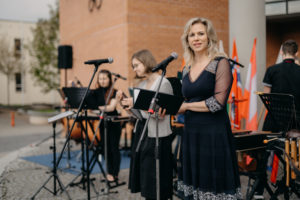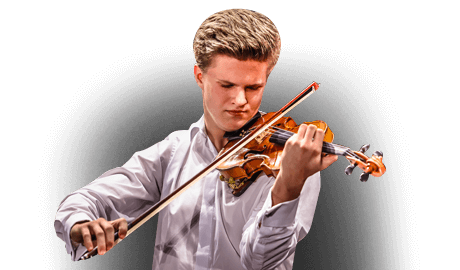“Těším se, až se školou rozezní zvuk houslí…”
rozhovor s ředitelkou soutěže Lenkou Lipenskou
V roce 2016 se Lenka Lipenská stala jednou z nejdůležitějších tváří Kocianovy houslové soutěže, když převzala pomysln ou štafetu od dlouholetého ředitele Kocianky Jiřího Tomáška. Práce na soutěži je od té doby jejím leitmotivem, který ji provází po celý rok. Organizační záležitosti týdne plné hudby však zůstávají oku návštěvníka skryté…
ou štafetu od dlouholetého ředitele Kocianky Jiřího Tomáška. Práce na soutěži je od té doby jejím leitmotivem, který ji provází po celý rok. Organizační záležitosti týdne plné hudby však zůstávají oku návštěvníka skryté…
Z obrazovek zpátky na jeviště, tak zní heslo letošní Kocianky. Jak konkrétně probíhala soutěž v roce 2021?
Po roce 2020, kdy se nekonalo téměř nic, jsme si v organizačním týmu řekli, že soutěž v roce 2021 rozhodně uspořádat chceme. V lednu téhož roku jsme rozhodli o distanční podobě soutěže, což se nakonec ukázalo jako šťastné rozhodnutí, protože ještě v květnu byl svět sevřený pandemií a nebyla jiná šance, jak Kocianku uspořádat.
Distančně znamenalo na dálku, tedy na základě zaslaných videozáznamů. S předsedou poroty jsme ročník definovali jako výjimečně jednokolovou soutěž pro všechny kategorie, přičemž povinný program mohl být natočený v jednom záznamu a volný program ve druhém záznamu. Porotci si v předstihu vyslechli soutěžní snímky každý u sebe doma, a poté jsme se spojili prostřednictvím videokonference k závěrečnému jednání poroty.
O online soutěži máme tendenci mluvit spíše negativně, je ale něco, co se loni ukázalo jako veliká výhoda a přínos?
Z mého pohledu je přínosem zkušenost, že přes různé komunikační platformy zvládneme nouzově vyučovat (anebo soutěžit či koncertovat) na dálku. Loňskou nutností natočit soutěžní snímek si soutěžící také alespoň osahali praxi s natáčením. I to se jim do života bude hodit. Výhodou pro porotce byla možnost pustit si videozáznam opakovaně a k jednotlivým soutěžním výkonům se vracet a porovnávat je.
Přesto pořád slyším, jak je dobře, že se konečně opět osobně setkáváme v Ústí nad Orlicí. Absence osobního setkání, ochuzení o prožitek koncertního vystoupení či nemožnost sdílet osobně zážitky a zkušenosti jsou však stěžejní fakta, která jako negativa stále převažují nad výše zmíněnými pozitivy.
Organizace tak velké akce jistě není jen tak, s čím má organizační výbor při pořádání prezenční soutěže nejvíce práce?
Naplnit všechna předsevzetí, úkoly a závazky, které si před vyhlášením soutěže dal. To znamená uspořádat soutěž i festival tak, aby se tu hosté – a pro mě především soutěžící houslisté – skvěle cítili. Aby se jim soutěž líbila, aby si užili přátelskou atmosféru, aby si ze soutěže odnášeli milou zkušenost. Jedná se i o zajištění zázemí pro soutěžící, a tímto děkuji Základní umělecké škole Jaroslava Kociana za spolupráci, zajištění cen, péče o odbornou i dětskou porotu, spolupráce se sponzory, příprava doprovodného semináře pro učitele, soutěžního orchestru apod. Těch bodů je hodně, ale organizační tým funguje, každý řeší svoji parketu.
Kteří konkrétní lidé se pod kolonkou “organizační tým” ukrývají? Bez koho by se tato soutěž nemohla uskutečnit?
Vyhlašovatelem soutěže je město Ústí nad Orlicí, do organizační týmu tedy patří starosta města Petr Hájek, který je zároveň předsedou Správní rady Nadačního fondu Mistra Jaroslava Kociana. Soutěž organizačně zajišťuje Klubcentrum v Ústí nad Orlicí zastoupené ředitelkou Jaroslavou Martinákovou a jeho pracovníkem Tomášem Fiedlerem, který je sekretářem soutěže. Dále v organizačním týmu zasedá Lucie Felgrová, vedoucí odboru školství, kultury, sportu, cestovního ruchu a propagace. No a ještě taky já jako ředitelka soutěže a zároveň zástupce ústeckoé ZUŠky, která je rovněž spolupořadatelem.
Mnoho účastníků se do Ústí sjíždí doslova z celého světa. Co vše je potřeba zajistit pro jejich příjemný pobyt ve východních Čechách?
My jako organizátoři se snažíme zajistit jim špičkové podmínky pro pobyt v ZUŠ během přípravy a soutěžení – třídy pro rozehrávání, perfektní koncertní sál, zajímavé ceny, které motivují k účasti, náležitou pozornost, zkrátka aby cítili, že jsou v Ústí srdečně vítáni.
Máte i nějaký “dramatický” zážitek z příprav?
Nepamatuji se na nic zásadního či katastrofálního. Samozřejmě vždy se něco objeví, ale to jsou drobnosti, které se operativně řeší. Zajímavé jsou spíše rámcové příběhy soutěžících, jako například zatoulaný kufr v Amsterdamu anglické houslistky, která musela odsoutěžit v maminčiných šatech, přesto ji to nerozhodilo a kategorii vyhrála.
A na co se naopak z pozice ředitelky v rámci celé soutěže nejvíce těšíte?
Těším se, až se soutěž rozběhne a školu rozezní zvuk houslí. Těším se na setkání s dětmi a jejich doprovodem, v mnoha případech mezi námi vzniklo krásné přátelství. Těším se na koncert posledního laureáta s Komorní filharmonií Pardubice – to je krásná tradice, kdy se po roce vrací absolutní vítěz a přednese své umění. Žasnu vždycky, co ti malí hudebníci umí. Jsou mimořádní. Svým uměním, ale i jednáním, vystupováním a zpravidla i skromností.
“I am looking forward to hearing the sound of violin soaring through the Art School…”
Interview with the competition director Lenka Lipenská
The motto of this year’s Kocianka is: No more screens, back on stage. What did the competition look like in 2021?
After 2020, with almost all events cancelled, our organizing team decided that the event definitely will happen in 2021. In January, we agreed on a distance online version of the competition, which proved to be a good decision since in May the world was still in the pandemic’s grasp and there would be no other way for Kocianka to take place.
The distance version meant that the contestants sent us videotapes. We agreed with the jury chairman on the competition consisting of only one round for all categories; with the compulsory programme being taped on one record, and the optional programme on another. The jury members listened to the records on their own at home, and then we communicated via an online conference to make a final decision.
We tend to perceive this online competition rather negatively, is there anything that proved to be a huge benefit or advantage?
I would say that one such benefit is the reality that through various communication platforms we are able to teach (or compete and make music) remotely. Also, the necessity to create a competition record provided the contestants with a chance to gain experience with video making. They can benefit from that in the future. An advantage for the jury was that they could play the record multiple times, they could always come back to certain parts and compare them.
But I still hear from everyone how good it is to be back in person in Ústí nad Orlicí. The absence of social gatherings, feelings of the live concerts, and the ability to share one’s experiences are all fundamental factors that still very much prevail over the abovementioned advantages.
Organizing an event of this size surely is not easy. What are the hardest organizational tasks of the in-person form?
To fulfil all resolutions, tasks and obligations that we promised to fulfil before the event. It means organizing the event in a way that our guests (mainly the participating violinists) feel good here. We want them to enjoy the competition, to experience a friendly atmosphere, to gain some positive experience from this. We need suitable facilities for this, and in this way, I would like express gratitude to the Jaroslav Kocian Art School for their cooperation, prize arrangement, the care for jury and children jury, cooperation with sponsors, organization of the accompanying seminar for teachers, competition orchestra organization etc. There are many other things. But the organizing team is functional and everybody does what they are supposed to do. I would like to say that working on this competition is my leitmotiv, stretching from the end of one year’s competition to the beginning of another.
Who are the people behind the term “organizing team”? Who are the essential people for this competition to take place?
The principal of the competition is the town of Ústí nad Orlicí, so the organizing team consists of the mayor Petr Hájek (who is also a chairman of the Master Jaroslav Kocian Endowment Fund Administrative Board). The organization is administered by the Klubcentrum Ústí nad Orlicí, represented by its director Jaroslava Martináková and its employee Tomáš Fiedler, who works as a competition secretary. Other members of the organization team are Lucie Felgrová (chief of the school, culture, sport, travelling and promotion department), and then there is me, as a competition director and an Ústí nad Orlicí Art School representative.
The contestants are coming from all around the world. What needs to be done to ensure that their stay in the Czech Republic is comfortable when they come for example from Mongolia?
As organizers, we try to secure an excellent accommodation and environment in the local Art School during the preparation period, meaning rehearsal classrooms, a high-quality concert hall, interesting prizes motivating them to compete; all in all, we try to make them feel welcome.
Are there any “dramatic” stories from the preparations?
I cannot recall anything significant or catastrophic. Of course, bad things happen all the time, but they are mere minorities that can be easily solved. However, there are interesting stories coming from the contestants themselves; such as the lost suitcase of one of the violinists in Amsterdam, she had to compete in her mother’s dress later, but that did not throw her off and she won her category.
What are you as a director looking forward the most?
I am looking forward to hearing the sound of violin soaring through the Art School. I am looking forward to meeting the children and their guardians, very often we form beautiful friendships. I am looking forward to the concert of our latest laureate accompanied by the Pardubice Chamber Philharmonic; it is a nice tradition, that the ultimate winner returns in the following year and performs. I am always speechless when I hear what these little musicians are capable of. They are extraordinary in their art, but also in their behaviour and modesty.

